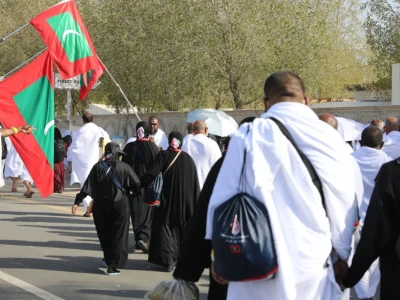
Maldives hajj delays blamed on quota restrictions: MHC
Ministry of Islamic Affairs were questioned by the Government Responsibility Committee about reported challenges and delays in Hajj arrangements.
Maldives Hajj Corporation (MHC) on Wednesday cited government control over the allocation of Hajj pilgrimage slots as the main cause of delays experienced by Maldivian pilgrims this year.
These comments came as the MHC and the Ministry of Islamic Affairs were questioned by the parliamentary government responsibility committee about reported challenges and delays in Hajj arrangements.
Dhihdhoo MP Abdul Latheef Mohamed, speaking at the committee hearing, raised concerns about the MHC's longstanding practice of providing estimated departure years for pilgrims who have already made payments. He questioned why, despite promises, many are unable to embark on the pilgrimage in their assigned year.
"We often hear that people who pay in advance are given fixed dates, yet they are ultimately deferred," said Abdul Latheef.
He also inquired whether changes in schedules are made to accommodate last-minute preferences of higher-paying pilgrims, expressing frustration that some pilgrims lose their spot at the last moment.
MHC’s Managing Director, Mohamed Shakeel, responded to these allegations, denying that wealthier individuals are allowed to bypass the official queue by paying more. Shakeel emphasised that while the Hajj Corporation provides pilgrims with estimated departure years, the actual number able to travel depends on certain constraints within the allotted quota.
Saudi Arabia typically grants the Maldives an annual Hajj quota of 1,000 slots. In the past, these were shared between the Hajj Corporation and private organisations, but in December, the government decided to centralise all official Hajj quotas under the MHC.
Despite this consolidation, Shakeel explained, the Hajj Corporation has only been able to send 850 pilgrims per year under normal circumstances. This year, however, constraints imposed by regulations prevented the full 850 from traveling.
Shakeel provided insight into how the Hajj quotas are distributed. Of the 1,000 slots available this year:
-
Elderly Pilgrims and Assistants: Those over 70 are permitted to bring an assistant, and these assistants count toward the total quota. This year, 87 slots were occupied by assistants for elderly pilgrims.
-
Government Quotas: The Islamic Ministry or government allocates additional slots without a fixed cap, resulting in 143 slots used for government-selected pilgrims this year.
-
Low-Income Pilgrims: Fifty slots were reserved for those unable to afford the pilgrimage, ensuring financial support for their Hajj journey.
-
Pilgrims with Serious Illnesses: Five percent of the total (50 slots) was dedicated to people with severe health conditions.
This distribution model, he said, reduced the total capacity available to regular paying pilgrims, contributing to the delays and rollover of waiting lists into future years. Shakeel explained that the current model leaves little flexibility, forcing some pilgrims to wait until their turn arrives within the fixed annual limit.
Acknowledging the rising frustration of Maldivians waiting to perform Hajj, Shakeel shared that President Mohamed Muizzu has intervened to reform the allocation process. According to an official letter from the President’s Office, the government will no longer allocate Hajj slots outside the regular queue system. This decision, Shakeel believes, will ensure a fairer distribution and prevent last-minute changes that have previously caused frustration among pilgrims.
"To address the practice of allocating slots under government quotas, President Muizzu has instructed us to prioritise the official waiting list," Shakeel said.
The new directive aims to eliminate any deviations from the queue order, reinforcing the commitment to a transparent process for all Maldivians seeking to fulfil the sacred pilgrimage.




